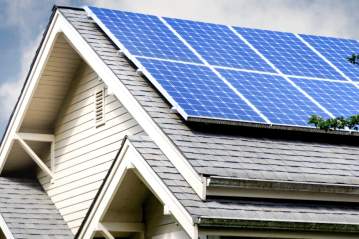
In today's era of increasing environmental awareness and the pursuit of sustainable energy sources, solar panels have emerged as a leading solution for clean and renewable power generation. As customers explore the potential of solar energy, one crucial aspect to consider is the efficiency of solar panels.
Efficiency directly impacts the performance and effectiveness of solar panels, making it an essential factor for customers looking to invest in solar energy products. In this article, we will delve into the factors that determine solar panel efficiency, explore the most efficient types of solar panels, discuss key attributes to consider when choosing panels, and touch upon the future prospects of solar panel efficiency.
1. Which Factors Determine the Efficiency of Solar Panels?
Solar panel efficiency is influenced by several key factors, including:
a) Material Quality: The quality of the materials used in manufacturing solar panels plays a significant role in their efficiency. High-quality materials, such as high-grade silicon, ensure better light absorption and conversion into electricity.
b) Cell Design: The design of solar cells impacts the efficiency of the panel. Factors such as the number and arrangement of cells, surface area, and contact mechanisms affect the overall performance.
c) Sunlight Conversion: The ability of solar panels to convert sunlight into electricity is crucial. Factors such as reflectance, transmittance, and absorption of sunlight by the panel's surface determine its efficiency.
2. What Types of Solar Panels Are the Most Efficient?
Solar panels come in various types, each offering different levels of efficiency. Let's explore three popular types:
a) Monocrystalline Solar Panels:
Monocrystalline solar panels are known for their high efficiency. They are made from single-crystal silicon, which offers excellent light absorption and conversion. Monocrystalline panels have a uniform dark color, often with rounded edges, making them easily recognizable. These panels perform exceptionally well in areas with limited space and are ideal for residential installations.
b) Polycrystalline Solar Panels:
Polycrystalline solar panels are made from multiple silicon crystals, resulting in a distinctive shattered glass appearance. Although they are slightly less efficient than monocrystalline panels, they offer a cost-effective solution without compromising overall performance. Polycrystalline panels are suitable for larger installations such as commercial or utility-scale projects.
c) Thin-Film Solar Panels:
Thin-film solar panels are made by depositing a thin layer of photovoltaic material onto a substrate, such as glass or metal. While these panels generally have lower efficiency compared to crystalline silicon panels, they offer unique advantages such as flexibility, lightweight construction, and the ability to be integrated into various surfaces. Thin-film panels are ideal for applications that require unconventional shapes or can benefit from their portability.
3. 4 Key Attributes When Choosing Solar Panels
When selecting solar panels for your specific needs, consider the following attributes:
a) Efficiency: The efficiency of solar panels directly impacts their power output. Higher efficiency means more electricity generation from the same amount of sunlight. Assess the efficiency rating of the panels to maximize your system's overall performance.
b) Durability and Warranty: Solar panels are a long-term investment, so it's crucial to consider their durability and warranty. Look for panels with a proven track record of reliability and a comprehensive warranty that covers performance and durability over an extended period.
c) Cost-effectiveness: While efficiency is important, it should be balanced with cost-effectiveness. Compare the upfront cost of the panels with their long-term benefits, including energy savings and potential incentives or rebates.
d) Suitability for Installation: Consider the available space, installation requirements, and aesthetic considerations when choosing solar panels. Certain types may be more suitable for specific installations, such as monocrystalline panels for residential rooftops or thin-film panels for curved surfaces.
4. The Future of Solar Panel Efficiency
Solar panel efficiency has made significant strides over the years, with ongoing research and development aiming to further improve this technology. Emerging advancements include:
a) Tandem Solar Cells: Tandem solar cells combine different materials with varying absorption properties to enhance efficiency. By utilizing multiple layers that each absorb different portions of the solar spectrum, tandem cells have the potential to achieve higher conversion efficiencies.
b) Perovskite Solar Cells: Perovskite solar cells are a promising area of research due to their low production cost and high efficiency potential. Scientists are continuously working to improve the stability and reliability of perovskite-based solar panels for widespread commercial use.
c) Solar Tracking Systems: Implementing solar tracking systems allows panels to follow the sun's movement, optimizing their exposure to sunlight throughout the day. This technology has the potential to increase overall energy production by maximizing the utilization of available sunlight.
5. The Bottom Line
As customers venture into the world of solar energy, understanding solar panel efficiency becomes essential for making informed decisions. Factors such as material quality, cell design, and sunlight conversion determine the efficiency of solar panels. Monocrystalline, polycrystalline, and thin-film panels are the most commonly used types, each with its unique advantages. When selecting solar panels, consider attributes such as efficiency, durability, cost-effectiveness, and suitability for installation.
Looking ahead, ongoing research and development in the field of solar energy offer promising advancements that may further enhance solar panel efficiency. By considering these factors and staying informed about technological advancements, customers can make the most of their solar energy investments while contributing to a sustainable future.
Remember, investing in solar energy is a long-term commitment, so it's important to consult with reputable solar energy providers and professionals to tailor a system that meets your specific needs and maximizes efficiency.
Ecgsolax has more than a decade of experience in the solar industry, and we’re dedicated to providing you with everything you need for your solar system.
We never stop innovating because we know how much clean energy means. At Ecgsolax, we offer a wide range of solar products, such as deep cycle batteries, all in one inverters, solar charge controllers, etc. Join us in creating a truly sustainable future!

0 comments